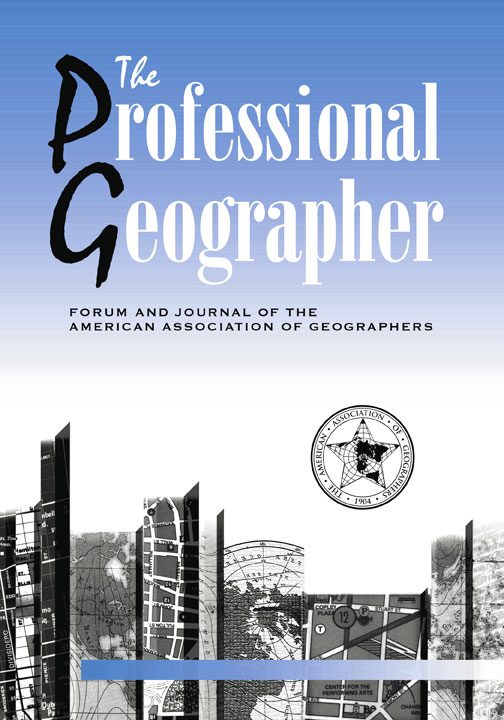AAG Book Awards Celebrate Works Written by Geographers
The AAG presented the following book awards during an awards luncheon at the 2014 AAG Annual Meeting in Tampa on April 12.
2013 John Brinckerhoff Jackson Prize
This award encourages and rewards American geographers who write books about the United States which convey the insights of professional geography in language that is both interesting and attractive to lay readers.
Anne Kelly Knowles, Middlebury College
Mastering Iron: The Struggle to Modernize an American Industry, 1800-1868
Published by the University of Chicago Press, 2013
In collaboration with Chester Harvey who is the cartographer for this copiously illustrated volume, Anne Kelly Knowles has set a new standard for historical geography. This noteworthy volume blends regional and local scale geography with rich archival sources to offer new insights into a neglected topic – the ante-bellum iron industry in the United States. She examines this particular economic activity because it provided the foundation for the country’s later industrial might, and it also allowed for the exploration of technology transfer from the United Kingdom to the U.S. during the time the industry was expanding across the landscape.
It is a richly empirical work and draws on a range of sources from company records to national surveys. Through these sources, she demonstrates the power of considering the industry at multiple scales – as part of the Atlantic World, the manufacturing core of the U.S., and company towns. She creatively uses color maps to vibrantly illustrate the migration of the industry from the eastern seaboard, the spatial realities of resources and processing centers, the relationship of the industry to population centers, and the layout of iron-making communities. The graphics add a perspective that few historians would be able to replicate in prose alone, making for a much more powerful and compelling argument. Throughout the work, she solidly documents her arguments with persuasive evidence. Family and corporate papers shore up her case at the local scale. To make her argument for the overall growth of the industry, she turned to a national survey of iron making and the U.S. Census. She deftly sustains her narrative at multiple scales. Drawn from the archives are a splendid array of historical photographs, contemporary maps, and colorful artwork that enliven the presentation. Knowles relies heavily on empirical evidence and avoids the tortured language of theoretically oriented treatises. Nonetheless, she clearly situates her work in the context of relevant theories and engages effectively with the likes of Latour and Harvey, as well as historians of technology.
The AAG Globe Book Award for Public Understanding of Geography
This award is given for a book written or co-authored by a geographer that conveys most powerfully the nature and importance of geography to the non-academic world.
Michael Dear, University of California, Berkeley
Why Walls Won’t Work: Repairing the US–Mexico Divide
Published by the Oxford University Press, 2013
Many of the best geographical stories take a feature on the land — either one that exists physically, or something placed there by human activity — and looks into backstory, evolution, and implications. It matters not at all if the feature is a theme park, an historic road, a botanical garden, a modest meetinghouse, a collection of skyscrapers: each is geographical in its quintessence. What Michael Dear gives us in his 2013 book, Why Walls Won’t Work: Repairing the US–Mexico Divide, is a particularly acute take on a vast human-imposed creation, the nearly 2,000-mile-long US-Mexico boundary.
Themes include cartography and border expeditions; discussions of law and order; comparisons of South and North; a chapter titled “Fortress USA;” and a concluding eponymous chapter, “Why Walls Won’t Work” that collectively spell out the long history of established uncertainty in the relationship of the United States and Mexico.
Perhaps the abiding question is not “why walls won’t work,” but when that will become obvious in a world of push-pull factors, international economic inequality, and migrant mobility. Text on a concluding page recaptures an energy many of us were reminded of in 1990 as the Berlin Wall was reduced to rubble: “The Wall separating Mexico and the US will come down. Walls always do. Partition is the crudest tool in the armory of geopolitics, an overt confession of failed diplomacy.”
Eminently worthy of the prestigious AAG Globe Book Award, Why Walls Won’t Work is a geographer-planner’s timely text on the dimensions of territory.
AAG Meridian Book Award for Outstanding Scholarly Work in Geography
This award is given for a book written by a geographer that makes an unusually important contribution to advancing the science and art of geography.
Richard Schroeder, Rutgers University
Africa after Apartheid: South Africa, Race and Nation in Tanzania
Published by the Indiana University Press, 2012
Africa after Apartheid explores what has happened to the region of southern Africa in the wake of Apartheid. A timely, important and deeply geographic book, Schroeder beautifully ties together economics, human migration, race relations, cultural changes, and a bit of physical landscape in tracing how the end of Apartheid had massive consequences for neighboring countries, especially in terms of capital investment and its concomitant race relations. While Schroeder focuses on a vitally important region and story, it could also be mirrored in other postcolonial settings. Where do rulers go, what do they do, and how do they act after the demise of their regime? In addition to Africa After Apartheid’s major empirical and theoretical contributions, the book is extremely well-written and accessible to non-specialists. His book significantly enhances our understanding of southern African geography.
Stuart Elden, University of Warwick
The Birth of Territory
Published by the University of Chicago Press, 2013
The Birth of Territory is a landmark study of territory as an organizational principle to divide, order, and control land. Despite territory’s foundational position in geography and politics, it has received relatively little critical attention in terms of its historical, geographical, and political production. Stuart Elden provides a thorough genealogy of territory and its evolution in western political thought from ancient to early modern periods and substantially pries open a concept that is often taken for granted. He convincingly presents a case for territory as contingent, contested, and far from settled in terms of its political salience and uneven development, with sources ranged from historical, political, and literacy texts and practices. Written in an eloquent and engaging style, Elden’s work will surely provide a new baseline for geographers’ understanding of territory and become an important text for geography and associated disciplines in the investigation of space, power, land, development, and political order.


